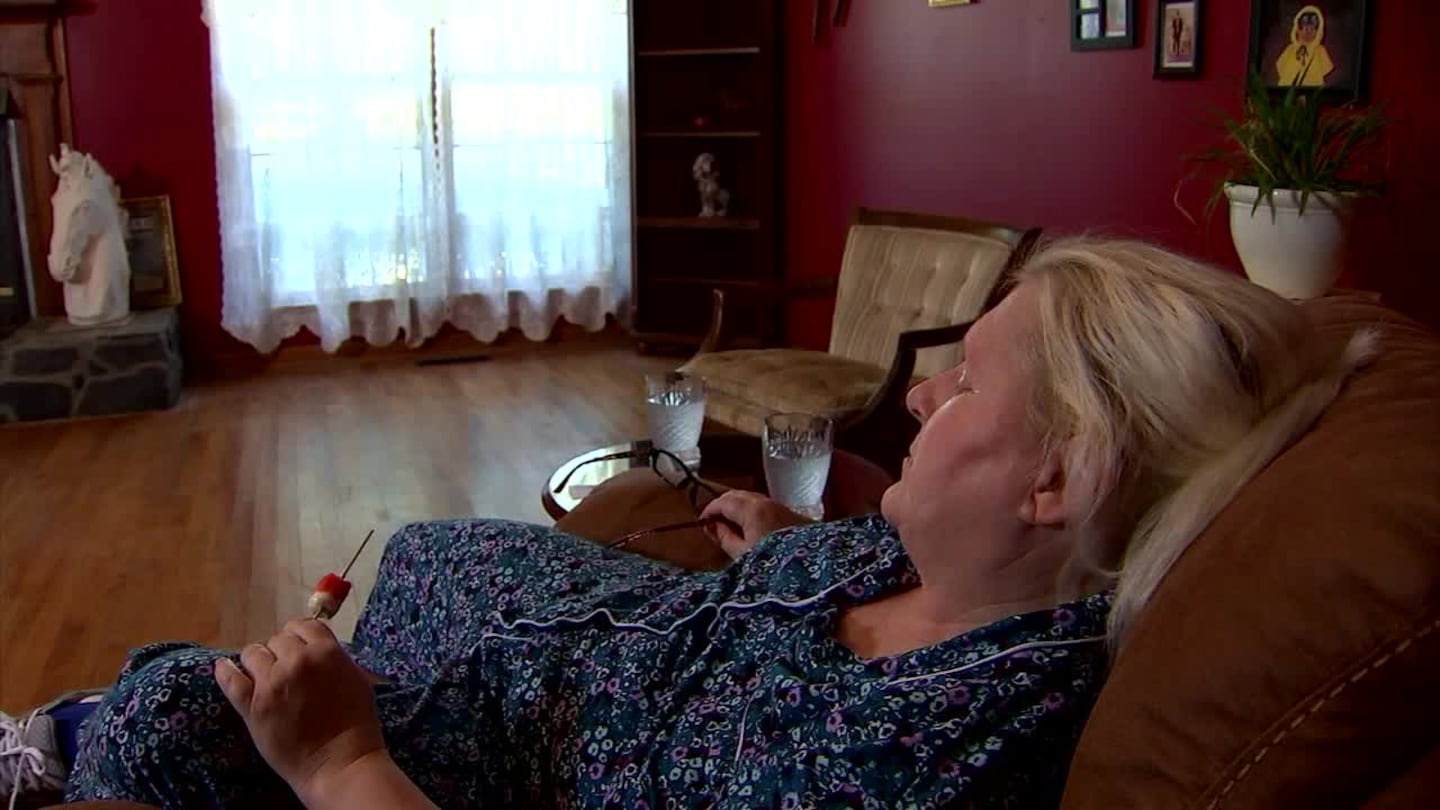A Georgia woman blames a controversial drug for ruining her life and the lives of thousands of other women. Her lawsuit claims several pharmaceutical companies failed to warn about the drug's crippling side effects.
The drug Lupron was originally approved for prostate cancer, but for the last 20 years women have taken it to relieve pelvic pain.
The Georgia woman’s case is being watched closely by patients both male and female who now
consider themselves Lupron victims.
Terry Paulsen is not yet 60 years old, but she looks closer to 80 years old.
"How do you feel right now?" Channel 2's consumer investigator Jim Strickland asked Paulsen.
“My body is on fire. My joints have arthritis everywhere,” Paulsen answered.
In another life, Paulsen was a neonatal emergency nurse and avid equestrian. For her interview with Channel 2, Paulsen needed a recliner. She has endured multiple surgeries, mysterious rashes and constant pain.
“Has this been going on for 14 years?” asked Strickland. “Since I got Lupron in 2004, we did not know this was coming,” replied Paulsen.
Lupron is an injection. It stops the production of sex hormones. Paulsen had only two shots to treat her endometriosis, painful lesions of uterine-like tissue that feed on estrogen.
“And this drug needs to have a black box warning on it, because I know what it did to me,” said Paulsen. At the time, the Lupron label cautioned about "... a loss in bone density. But for a period of up to six months, this bone loss should not be clinically significant.”
The current label drops that claim.
“Her immune system began to attack her own bones. She got osteopenia and osteoporosis and now she’s got terrible osteoporosis,” said Dr. Alan Levin, he is an immunologist with 50 years of experience, including consulting with the Food and Drug Administration. Levin has a second career. He’s Paulsen’s lawyer.
“How many women are out here suffering?” Strickland asked Levin. “The answer is I don’t know because I’m only dealing with Terry, but in the thousands for sure,” answered Levin.
Strickland checked with the FDA, and Lupron users have filed nearly 24,000 reports of adverse reactions. Sixty percent of those were filed by women. The FDA deemed more than half of them serious cases.
RECENT INVESTIGATIONS:
- Investigation finds decades-long illegal deal at Georgia Tech
- Kia Soul seeing alarming number in car fires, experts say
- Hunters beware: DNR, fellow hunters warn of tree stand dangers this season
“It feels like I have 80-year-old bones,” said 22-year-old Brooklyn Harbin. She’s one of about another thousand people who filed an adverse reaction report. She had been an active and athletic 10-year-old. But she began her period too early.
A doctor prescribed Lupron for Harbin to halt early puberty.
“The back pain became very, very severe. It got very, very depressing having to be in a wheelchair in
the fifth grade,” said Harbin.
"I feel that Lupron or any of the similar types of medications should never be used in someone under the age of 21," said Dr. Ken Sinervo. He a gynecologist specializing in endometriosis surgery. He told Channel 2 Action News he's seen many women suffering memory loss and joint pain.
“Does the FDA not know of these other side effects?” Strickland asked Sinervo. “Well, I’m not sure exactly what the FDA knows,” replied Sinervo.
Strickland emailed Lupron’s maker to ask why there is no warning on the box about memory loss or joint pain.
The pharmaceutical company responded: “AbbVie regularly monitors and reports to appropriate regulatory agencies new safety information on an ongoing basis to ensure that our label contains accurate and up-to-date information to assist physicians and patients.”
Lupron lawyers convinced a federal judge to seal the results from several clinical trials, but not until an expert witness disclosed evidence that even after a year off the drug, 62 percent of women did not regain normal estrogen levels.
AbbVie refused to comment on the studies or on Paulsen.
“There is not a dime that can pay for what I have lost,” said Paulsen.
AbbVie declined to give Channel 2 Action News an on-camera interview.
According to its annual report, Lupron sales totaled $829 million in 2017. This year, they will report sales of a brand-new endometriosis pain pill approved by the FDA three months ago. The drug is called Orilissa. It treats the pain, not the condition.
AbbVie has launched a high-dollar advertising campaign encouraging women to talk to their doctors about the symptoms of endometriosis.
“How do you feel about the 'Speak Endo' campaign?” Strickland asked Sinervo. “I feel that they’re trying to recruit patients you know to try their medication,” answered Sinervo.
He says the pill will only mask the pain.
“Then as soon as they come off their medications within six to twelve months their pain is back and worse than before often,” said Sinervo.
AbbVie created an animation that shows how endometriosis thrives on estrogen. Orilissa works in the pituitary gland to reduce the hormone level, and thus the pain.
“Absolutely there is a danger there. Because these pills have an enormous amount of effect on the hormones on the body,” said Dr. Levin.
“You cannot take a drug that effects the pituitary gland. It’s your master gland so it’s a trickle-down effect,” said Paulsen.
Like Lupron, Orilissa can lead to permanent bone loss. The label also warns of possible liver problems and suicidal thoughts. One clinical trial participant took their own life.
In a report released in August, an independent panel of medical experts considered the question: Is the evidence adequate to demonstrate that the net health benefit of (Orilissa) is superior to that provided by (Lupron)?
The vote was a unanimous no.
“But unfortunately, it’s impossible to predict who’s going to feel great and who’s going to have those terrible side effects. So, it’s kind of a crap shoot,” said Sinervo.
Strickland emailed AbbVie after he found the independent report. The company responded with a list of counter arguments that the panel’s “methods to evaluate clinical value are flawed as noted in our public comments.”
AbbVie is pricing the drug at nearly $850 a month. Reuters reports that stock analysts who cover big pharma figure the revenue will top $1 billion a year by 2022.
Cox Media Group







